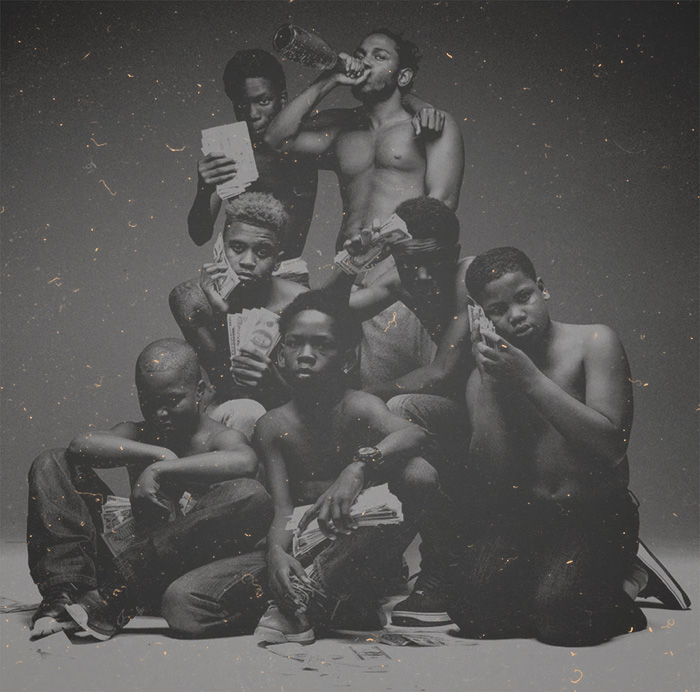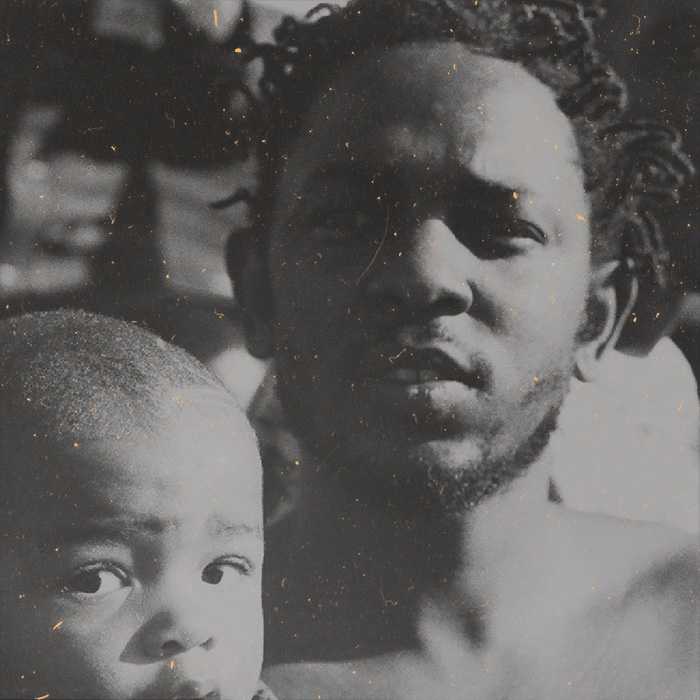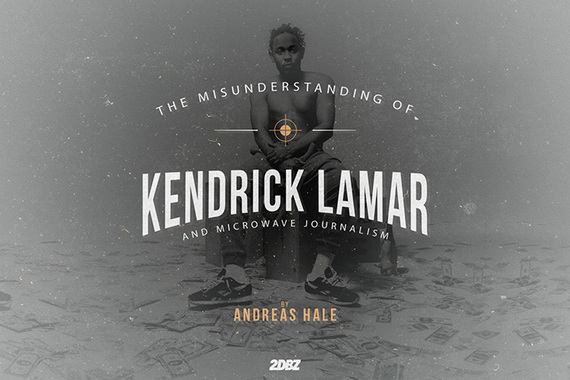
Originally published at 2DopeBoyz.com. It was with a raised eyebrow that I read Complex’s column titled “Why Did Everyone Claim to Enjoy Kendrick Lamar’s ‘To Pimp a Butterfly.'” In the midst of his “Kunta’s Groove Sessions” run, a couple of stories surfaced suggesting that Lamar was performing in half full arenas to somewhat fan flames regarding how he is received at live shows. And then this column came nearly eight months after the 28-year-old’s album dropped. The fact that we’re even talking about an album that dropped nearly a year ago should be considered an achievement considering our frighteningly short attention spans …
It was with a raised eyebrow that I read Complex’s column titled “Why Did Everyone Claim to Enjoy Kendrick Lamar’s ‘To Pimp a Butterfly.'” In the midst of his “Kunta’s Groove Sessions” run, a couple of stories surfaced suggesting that Lamar was performing in half full arenas to somewhat fan flames regarding how he is received at live shows.
And then this column came nearly eight months after the 28-year-old’s album dropped. The fact that we’re even talking about an album that dropped nearly a year ago should be considered an achievement considering our frighteningly short attention spans that forget an album a week after it drops. But I digress…
It was a strangely titled column with a questionable agenda, to say the least.
But my column isn’t necessarily about whether or not it’s okay to like Kendrick Lamar’s TPAB album. Music is subjective. Like it or don’t. Nobody cares that much. This is more about the sh*tty state of journalism that we are currently living in. It’s a state of journalism that is dictated by instant gratification and social media. A state of groupies who became bloggers in an effort to get inside the industry and subsequently strip down their integrity like a stripper’s first day at King of Diamonds in the pursuit of perceived happiness.
The title alone suggests that the author is keenly aware that many music bloggers do not dare to be different because rocking the boat on anything with a social message isn’t fashionable. In so many ways, it also questions their own integrity by suggesting that they wanted to like an album more than they did, but likely went against their better judgment to keep things kosher with their readership.
I don’t know what the writer or Complex’s motivations to publish this particular column were, nor will I spend precious space trying to explain whether or not it teeters into troll territory. However, I will point out a passage that stuck out like a sore thumb and encapsulates the problem with hip-hop journalism today.
I think most fans and critics would agree that Kendrick Lamar’s To Pimp a Butterfly is, indeed, overwhelming. I reviewed To Pimp a Butterfly in about 72 hours. In that narrow band of time, I “got” the album’s messages and themes but couldn’t grasp the motivations for the album’s sound. Why, in 2015, would a recently platinum-selling rapper make a jazz album with Lalah Hathaway, Ron Isley, and George Clinton?
On the surface, the paragraph doesn’t seem like much but its layers are extraordinarily deep. Like, Jacques Cousteau deep.
Kendrick Lamar probably didn’t make this album for you; whoever “you” are. Some of the themes and messages simply aren’t meant for “you.” Appreciate? Yes. Empathize with? Perhaps. Relate to? Nah. Kendrick Lamar wasn’t trying to turn you into a pro-black Compton kid with a chip on his shoulder by listening to his album. If its themes didn’t resonate with you, he knew a majority would rest their laurels on the notion of “Boy, Kendrick Lamar sure can rap, can’t he?” You may not completely understand the picture he’s painting, but the talent is undeniable and already proven.
But you know what’s being missed? While both Section 80 and good kid, m.A.A.d city were influenced by legendary emcees including Tupac, Ice Cube and Nas, TPAB‘s influences are less hip hop and more social charged spoken word, funk and jazz.
The late Gil Scott-Heron’s unique blend of politics and poetry over soul, funk and jazz wasn’t made for “you.” “The Revolution Will Not Be Televised” wasn’t created to go platinum or see the phrase used in advertisements that are counter to what the poet lamented about. Kendrick Lamar’s motivations aren’t necessarily about making his culture popular. Instead, they ended up fitting a narrative on Black America that had been writing itself in blood over the past decade with numerous unarmed black bodies crumbled under the strong arm of the law.
We tend to forget that Public Enemy performed in front of swarms of Caucasian fans that weren’t the intended target for their pro-black message. But that message didn’t change because of the audience. It didn’t need to. Nor should the messenger be ashamed into wanting to shift the narrative.

The seeds of Kendrick Lamar motivation to collaborate with George Clinton, Lalah Hathaway and Ronald Isley were planted well before GKMC dropped. Unlike most emcees that drop freestyles over popular production to make a name for themselves, the Compton rapper had a penchant for picking on more obscure beats to rhyme on. I mean, he certainly didn’t select the Foreign Exchange’s “Daykeeper” instrumental for “Vanity Slaves” because he knew the masses would recognize it.
Every success Kendrick Lamar achieved has been in spite of what the culture deems as popular. Nothing on the album is meant for the club. Hell, it’s not a “stadium album” like so many artists create with the sole purpose of it sounding phenomenal in an arena.
That was never the point.
There is also an underserviced subplot that peeks between the paragraphs of Justin Charity’s op-ed but the nail isn’t quite hammered through the wood. That wasn’t the focus of the Complex piece, but it’s a significant piece of the pie for this column that you’re reading.
72 hours is not enough to truly digest an album and a testament to microwave journalism.
When I started my career in music journalism, album reviews were something that, at least for me, were carefully crafted after numerous listens. Sure, there was a deadline in place by my editors, but the influence of social media and the god-awful rat race of posting grammatically flawed content without proper checks and balances superseding quality has, essentially, ruined the album review. Writers are more concerned with being first with their scattered think pieces rather than truly digesting an album.
You know how it is, right? You buy an album and have your favorite song for about a week and play it to death. However, three weeks in, another song emerges as your favorite. But how can you properly encapsulate that in a 24-48 hour turnaround from the point when an album leaks? If I wrote a review for Illmatic 48 hours after it initially dropped, I would have failed to document the significance of “New York State Of Mind” because I was so overwhelmed by “Life’s A Bitch” and “The World Is Yours” that it dominated my initial thoughts and would have driven my review.
Think about it.
How many reviews that drop a day after an album releases still ring true to that writer? I sincerely doubt that every writer who has turned around an album review in a day can look back and stand by every single word he/she said. Not aloud, at least.
But that’s the world we live in.
Another problem is how the Internet has created monsters out of moderately skilled writers. Many are social misfits who use this industry to rub shoulders with celebrities, who just so happen to also possess fragile egos and are in need of constant affirmation. The Internet has essentially shortened the six degrees of separation theory to a single degree – or twitter follower – and created a space where faux friendships are massaged with ulterior motives.
To champion Kendrick Lamar and his avant-garde stance of the art being more important than the image is en vogue for some but entirely too hypocritical for my taste. It’s just like how the Future bandwagon added several rows of extra seats when people didn’t want to be left behind. But these are the very people who ignored what Future had been doing for so long. All of a sudden, now they get it?

It’s so hypocritical to ignore something for so long but then act like you always wanted it. It’s only because it’s the flavor of the month and everybody wants a taste.
Furthermore, TPAB is the quintessential “I-gave-you-what-you-want-so-I’ll-do-as-I-please (and-f*ck-you-if-you-don’t-like-it)” album. It’s his De La Soul Is Dead album that abandons every box you previously attempted to put him in. The weight of the content isn’t comfortable to push up off of your chest but you don’t want to be the one who makes the mistake of not calling it a classic. It takes some work to digest the meal that the artist formally known as K. Dot is offering you. But it is guaranteed to give you food for thought if you are able to devour the three-course meal. And for true food aficionados who don’t pledge their allegiance to Yelp reviews, you can taste every ounce of seasoning and recognize what chefs influenced Lamar’s culinary practice.
Honestly, some people just want McDonalds. Don’t be mad if that’s you and stop fronting like you enjoy fine dining because it feels like it’s the right thing to do. Enjoy your Big Mac and be proud of it. It is what it is.
Now, on to this other qualm that I have with hip-hop journalism and the African American scribes who claim to be the authoritative voice of a culture. It’s fascinating that the most pushback we’ve seen on this album has come from black writers who deem the album as “too black.”
It’s like black journalists are apologizing on behalf of their pro-black peers for being culturally offensive to a kumbaya nation that simply doesn’t exist. They privately whisper “Black Lives Matter” but when push comes to shove they are leading imaginary picket lines waving an “All Lives Matter” flag with a group of people who, in all actuality, are rooting for them to stand in opposition to police brutality.
Tell me, who are you scared of offending?
You know who is scared to talk about race more than white people? Black people. It’s a wild notion when you think about it. With all the casts of color that are being incubated in writing rooms across Hollywood, you would think that that our narrative, which has proven to still be underserviced, would be a welcome addition to the conversation. Instead, it’s like we are trying to silence ourselves while out in the field because we still hope to one day make it inside of Uncle Tom’s Cabin. That may sound harsh but take a look at the landscape of black celebrities and how they deliberately shift their cultural allegiances in an effort to be accepted.
These are the same black folks who ironically use the “N-word” in the presence of white people because a majority of their friends happen to be white. But not because it happened organically, rather, because they purposefully sought to create a melting pot network of friends to show off to their black peers as if it is a badge of honor. That’s fine and all, but why continue to degrade yourself by unnecessarily dropping N-bombs? Do you see the paradox? These are the very same black writers who go out of their way to be the voice of authority on all things black and harshly grade everything in a manner that suggests that they just might be a little self-loathing. The ones who silently panic when there is a room full of black people but are the first to publicly point out that there isn’t enough color on their TVs any given time.
And now you’re ashamed to be too black? Chuck D would be ashamed of your trifling ass.

All this brings me back to Kendrick Lamar’s all-of-a-sudden extraordinarily divisive album.
The Complex column is essentially calling out those who claim they want to wife the real kinky haired sistas with a few stretch marks and a pair of breasts that have a natural droop but drool incessantly over plastic Instagram models that gyrate their enhanced body parts in 15 seconds clips to hundreds of thousands of followers.
Here’s the moral of the story: You don’t have to lie to kick it. But you also don’t have to go out of your way to sh*t on something in an effort to gain more traffic.
Stand for what you enjoy and be able to back it up when challenged. That’s the problem with hip hop journalism today. To Pimp A Butterfly is a challenging album to defend over time because it sounds like nothing else out there. It’s themes and overall sound pulls from the memory of a long-term music fan but is problematic in a vacuum of short term memory loss.
To be honest, we might all be overthink-piecing-this. But it parallels the American news cycle and presents a much bigger issue in our culture.
It’s not the school shootings (short term); it’s gun control laws in America (long term) that need to be addressed.
It’s not Kendrick Lamar’s album (short term), it’s how we handle these discussions that the album presents.
But I’m just a critic, who the hell am I?
—
Andreas Hale is a music, entertainment and sports journalist who has contributed to outlets including MTV, Billboard, GRAMMY, MTV, Sherdog, Yahoo, The Ring and a host of others. He’s also the co-host of The Corner, a weekly podcast that covers boxing, MMA and pro wrestling from the perspective of the hip hop generation. You can follow him on Twitter @AndreasHale
— This feed and its contents are the property of The Huffington Post, and use is subject to our terms. It may be used for personal consumption, but may not be distributed on a website.
Read More:
The Misunderstanding Of Kendrick Lamar & Microwave Journalism


























